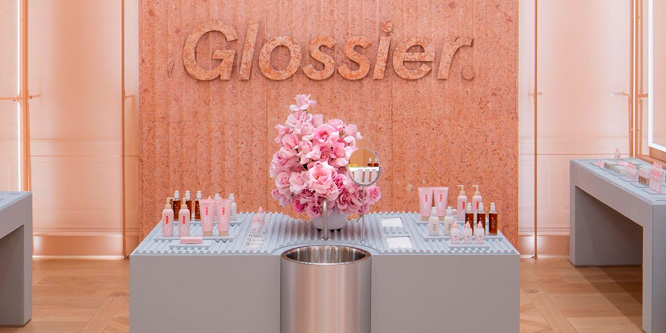
Glossier’s London store, Dec. 2021 – Photo: Glossier
Glossier seeks to recapture its shine after a tough 2021
Glossier revealed that it is laying off more than a third of its corporate workforce and outsourcing some technology functions after admitting to “some mistakes” in management strategy.
“Over the past two years, we prioritized certain strategic projects that distracted us from the laser-focus we needed to have on our core business: scaling our beauty brand,” CEO Emily Weiss wrote in an internal email first obtained by Modern Retail. “We also got ahead of ourselves on hiring. These missteps are on me.”
Launched in 2014 as an outgrowth of the Into the Gloss beauty blog, Glossier was heralded as a beauty trailblazer for breaking out without department store distribution. The direct to consumer brand was praised for its social media buzz, its Millennial-pink aesthetic, accessible and affordable products, and for foregoing heavily-caked supermodels in marketing.
Last July, Glossier was valued at $1.8 billion in a funding round.
A recent Business of Fashion article details how Glossier’s U.S. sales tumbled 26 percent in 2021 as new products failed to resonate, the pink palette became dated and inclusivity messaging became all-too common.
“When everyone says you are a ‘once-in-a-generation brand’ you could trick yourself into believing yours would be a brand that withstands the test of time,” a beauty insider told Business of Fashion. “So why change? Why evolve?”
The competitive landscape has also been altered by the emergence of Shops from Sephora inside Kohl’s and Ulta inside Target as well as beauty additions by Walmart. With its sky-high valuation likely prohibiting a sale, the report inferred Glossier may have to explore wholesale distribution.
The layoffs, affecting over 80 jobs, come as Glossier in the latter part of last year returned to physical retail with openings in Seattle, Los Angeles and London after closing its first two stores due to the pandemic. Known for its one-on-one consultations and “Instagrammable moments,” the stores often drew lines down the block, pre-pandemic.
Ms. Weiss said last year of Glossier’s return to physical retail, “At a time when the appetite for online shopping, accelerated by the pandemic, has never been stronger, the promise of immersive, real-life experiences rooted in discovery and connection is paradoxically also more resonant than ever.”
- Glossier lays off over 80 employees – Modern Retail
- Glossier lays off over 80 employees – Glossy
- How Glossier Lost Its Grip – Beauty of Fashion
- Glossier CEO Says Beauty Startup Got ‘Distracted’ and Must Cut Jobs – The Wall Street Journal
- COVID-19 Retail Updates – Glossier
- Glossier lays off over 80 employees – Glossier
- Apple-inspired Glossier opens ‘adult Disneyland’ flagship store – RetailWire
- What Went Wrong At Glossier? – Refinery 29
Discussion Questions
DISCUSSION QUESTIONS: What internal or external issues appear to be behind Glossier’s recent challenges? What steps should Glossier consider to regain the brand’s momentum given the evolving beauty space?


Glossier’s recent challenges are what many brands face once they hit success – they lose sight of retail fundamentals and what their brand actually stands for.
Brands start to dip their toes into new products and strategies without investing in what makes them stand out — which is why it’s important to stay close to the customer and close the feedback loop.
We have seen this with digitally native DTC brands that start to scale and don’t invest in technologies like inventory management and planning tools – they are consistently out of stock of core items during peak season and can’t catch up. Their product assortments become too big or they start to plateau because they stop creating and innovating. There are so many lessons to be learned from the Glossier story.
As for BOF article that stated (among other things) that the inclusivity messaging became too common is awful. Beauty should be inclusive. The article suggests that inclusivity is purely a marketing tactic and I don’t believe this to be so. I want to believe that brands that are inclusive stay that way and that it’s more about making a profit from a marketing campaign or trend. I still believe in Glossier and even as I shop on their site (I am a customer), their imagery is inclusive and I can relate as a woman of color. This is important to me and I will continue to shop the brand but they must stay true to their core product range that got them success in the first place.
Glossier’s impact on beauty has been significant, especially in the initial launching days. However it has experienced internal issues regarding hiring the right leadership team to scale the brand, not focusing on expanding its target market and lacking the understanding that DTC can have its positive factors, but is an expensive and difficult model to sustain long-term. Some external factors that have really impacted the business are the timing of rolling out Glossier Play (not sure this is their fault) and a highly competitive beauty landscape. The last point to make is that consumers shop beauty by product type and not by brand; very few consumers use ALL of the same branded beauty products. Just look in any make-up bag and you will see an assortment of brands. Mono-beauty brands have a tougher time retaining customers over time, especially with a limited assortment of products. Glossier should go back to its roots and focus on social commerce and m-commerce/e-commerce, building a brand community, figuring out how to make DTC work and partnering with other retailers to expand the market. Before all of that, however, the CEO needs to fix the culture, pronto.
Shelley — you are spot on! Going back to Glossier’s roots is the secret sauce. Focus on what they do best and give the customers what they want. Product is everything!